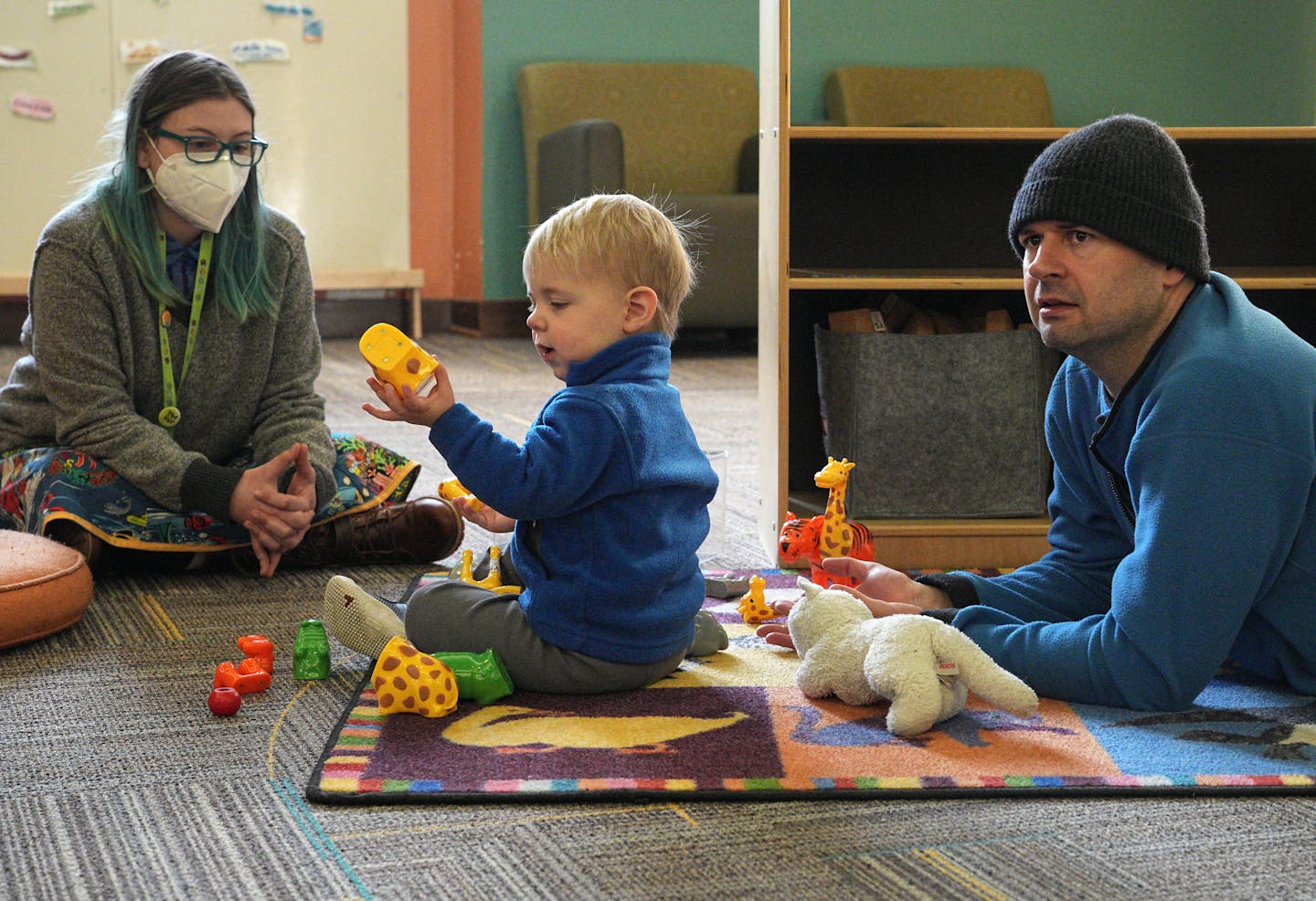The ongoing evolution of St. Paul's libraries from centers of literacy into community hubs connecting residents to services was on full display on a recent frigid morning.
At the west end of the George Latimer Central Library downtown, minutes after the end of children's story time, 2-year-old Henrik Van Nurden played with toy animals while his dad, Jon, and librarian Rhica Hogue sat nearby. At the east end, several people warmed themselves while others browsed tables covered with snacks or toiletries. Others talked to community outreach workers about their health and wellness needs.
In the middle were library workers carrying walkie talkies and mobile alarms. A series of incidents earlier this year spurred steps to boost security.
City Council Member Jane Prince, who was chair of the Library Board until August, wonders if St. Paul is asking too much of its librarians.
"Our parks and libraries are places where people should be able to come and be safe and be treated with compassion. But we can't do that unless we can assure the safety and security of our staff," she said.
Maureen Hartman, interim library director, said libraries are working to balance their traditional role of connecting people with the information they need to live better lives while improving security at a time when people's struggles with mental illness and drug use are showing up in library spaces.
The key, she said, is improving safety while also keeping libraries accessible to the range of people who need them.
"We are seeing folks who need resources beyond what our library staff can provide," Hartman said. "Every amazing thing that happens in our community happens in our libraries. But the challenges that happen in our communities happen in our libraries, too."
Safety, staffing concerns
It was a rough summer at the Latimer Central Library and a few others.
During a City Council budget hearing Sept. 21 at the Como Lakeside Pavilion, several library staff members shared stories about assaults, hostile confrontations and staffing shortages.
Eric Yang, who has worked in the system for 23 years, told council members the Sun Ray Library closed for 2 1/2 days because of illness and lack of staffing.
"This is something I have never actually had to do in my time working for the libraries," he said.
Library worker Kianna Tichy said some people who use St. Paul's libraries "have real problems. And when they have problems, they bring them to us." Staff members have been threatened, and "there's been absolutely no communication about what we're supposed to do," she said.
Isaac Mielke, a library associate at the Riverview Branch Library on the West Side, said he's received death threats in the past year and people have held knives up to him.
"I don't get paid enough to deal with that," he told council members.
Cindy Koy, who works at the Latimer Central Library, told the council, "I'm the one who has had a patron forcibly kiss me. … That patron came in earlier, and he threatened a staff member. For some reason, management decided they were allowed to come back."
Calls last week seeking additional comment from those staff members were not returned.
Betsy Hunter, a member of AFSCME Local 1842, said in an email: "Our union will fight in negotiations for the shared values that our workers and residents deserve and expect."
City and library officials say they are working to enhance safety.
Firefighters on light duty or between calls started keeping watch at the downtown library over the summer, and extra security was added. Several areas that are hard to monitor have been closed to the public, and staff members are encouraged to work in pairs.
In addition, the city has allocated $1.5 million in American Rescue Plan money to a plan that will add safety specialists to the downtown library and others.
"We care deeply about our staff, and we want to make sure they are letting leadership know when something happens in one of our libraries," Hartman said. "We can't prevent all incidents, but we want to be prepared to respond — respond to specific things but also respond long term."
Making connections
At the Rondo Community Library, manager Kali Freeman said strong connections with the community it serves and partnerships with other agencies are ways to boost safety and security while expanding services. Rondo has security guards, but it also shares a social worker from the Wilder Foundation with the Latimer Central Library. And it gives space to an outreach worker from Women's Advocates in St. Paul to meet with people dealing with violence at home.
"Our community needs more than we can provide," Freeman said. "So, our partnerships allow us to make our support system wider."
Rondo still offers traditional library services. On a recent tour, Freeman proudly showed off Rondo's Homework Center — the busiest in the city for homework help, serving 30-40 learners a night. As many as 15 volunteers step up to help each evening.
But making libraries comprehensive centers for families makes sense, she said. Whether that's "Book Club in a Bag" or help writing a resume or referring people to housing advocates, libraries are trusted places to find help. In that way, Freeman said the city isn't asking too much.
"What happens in St. Paul happens in our libraries. We are an open space," she said. "So, we have had to pivot, find different ways to do things. Check on people. When support is there, I think it makes all the difference."







